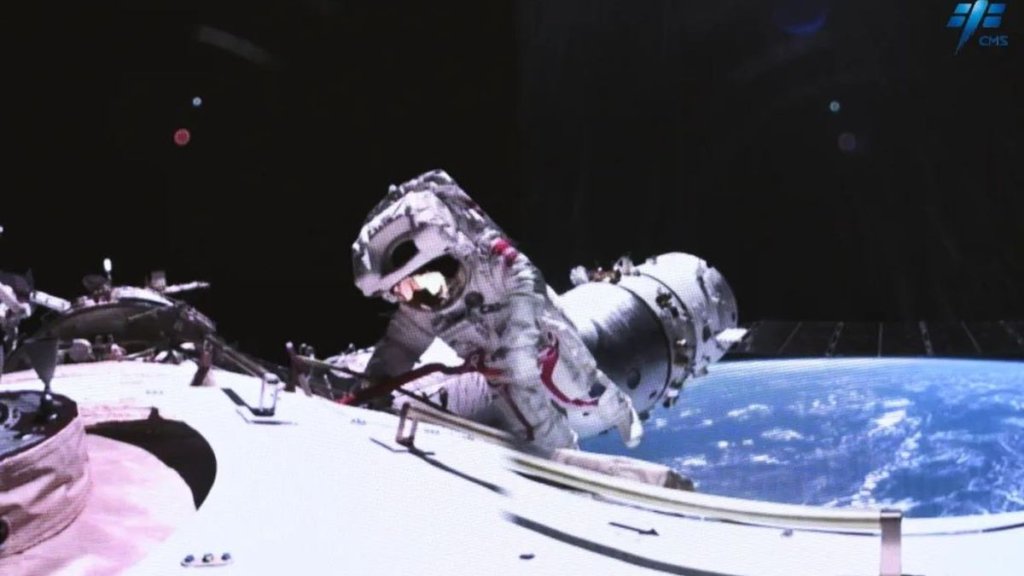
China’s Tiangong space station damaged by debris strike: report (Image Credit: Space.com)
China will beef up its space debris procedures for astronauts after a partial loss of power on its Tiangong space station, according to state media.
Astronauts on the Shenzhou 17 mission conducted two spacewalks outside the Tiangong space station this winter, most recently on March 1. At the time, Chinese media said there had been a partial (but minor) loss of power supply after the outpost’s solar panels suffered a debris strike.
These spacewalks were a success, the China Manned Space Agency (CMSA) said Wednesday (April 24) in a press conference reported by the state-run media outlet Xinhua. The agency also plans to do more in the future to guard against space debris issues in orbit.
“The space station’s core module Tianhe had suffered a partial loss of power supply due to the impact of the space debris on the solar wing’s power cables,” Xinhua reported, paraphrasing CMSA deputy director Lin Xiqiang.
Related: Watch Chinese astronauts fix Tiangong space station solar wing in 8-hour spacewalk (video)
Xinhua did not specify if the debris was from micrometeoroids or from human activity in space. Both debris types pose threats to Tiangong as well as the International Space Station (ISS).
Human-generated orbital debris is growing: the North American Aerospace Defense Command (NORAD) tracks more than 43,000 overall space objects as of April 2024, according to SpaceTrack.org. As for active satellites, there are more than 7,500 as of May 2023, according to the Union for Concerned Scientists — most of them members of SpaceX’s giant Starlink broadband megaconstellation.
ISS controllers, working with NORAD, have had to move the space station out of the way of debris more than 30 times since its first modules launched in 1998. The guidelines are strict, necessitating a maneuver if any debris arrives in a “pizza box” roughly 2.5 miles by 30 miles by 30 miles (4 by 50 by 50 kilometers) with the ISS at the center, according to agency officials.
China’s space station as well has “executed maneuvers on multiple occasions to evade space debris impacts”, according to the Xinhua report, and Lin discussed several measures the CMSA is taking to prevent future issues. (Tiangong’s first element, the Tianhe core module, launched in 2021.)
“China has enhanced its capability to precisely forecast the orbits of the space station and small low-orbit targets, optimized the procedures for space collision warning and avoidance, and reduced the false alarm rate by 30%, according to Lin,” Xinhua wrote, without revealing specifics.
Upcoming measures include more video scrutiny of Tiangong using a high-definition camera on its robotic arm and tasking the Shenzhou 18 crew (who are scheduled to launch on Thursday, April 25) to put in more reinforcements. They “will be tasked with installing space debris protection reinforcements for extravehicular piping, cables and critical equipment during their extravehicular activities,” Xinhua reported.
NASA works separately from China in space matters due to a 2011 directive known as the Wolf amendment, which prohibits bilateral agreements and coordination between NASA and Chinese government entities without express permission from Congress.
Lately, NASA and China have been forming independent coalitions for lunar exploration: Nearly 40 nations have signed on to NASA’s Artemis Accords, with Sweden, Slovenia and Switzerland all joining in recent days. China, working with Russia, announced Wednesday three new partners for its own coalition: Nicaragua, the Asia-Pacific Space Cooperation Organization and the Arab Union for Astronomy and Space Science.





